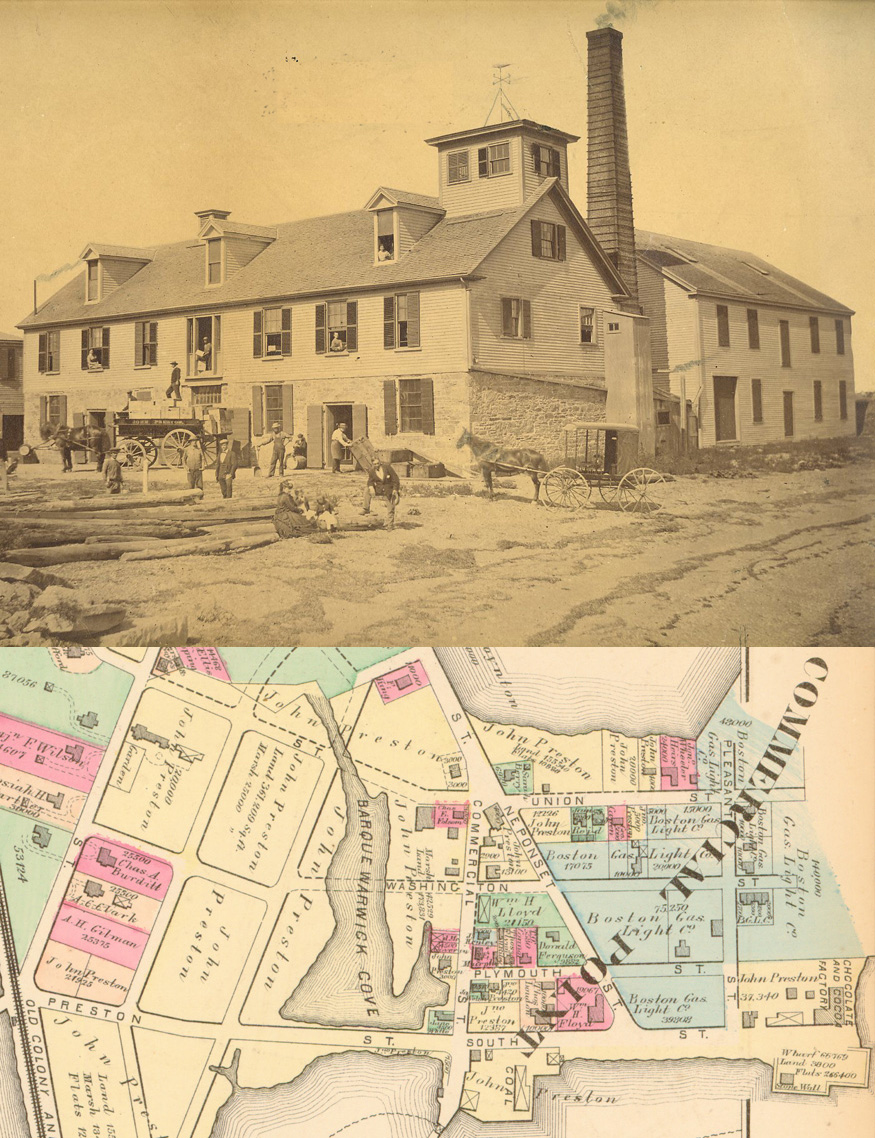Dorchester Illustration no. 2456 Preston Chocolate Factory
One of the buildings of the Baker Chocolate complex was named the Preston building in honor of another Dorchester chocolate maker, a former competitor to Baker. The Preston building is a three-story building on the Dorchester side of the river east of the bridge tucked behind the larger building that fronts on Adams Street, approximating the original location of the Edward Preston’s early mill.
As early as 1770 Edward Preston owned a chocolate mill on the Dorchester side of the Neponset River east of the bridge at Lower Mills. By the 1850s John Preston had acquired land for a factory and a wharf at Commercial Point. Today’s photograph shows the factory building. The detail from the 1874 atlas shows the John Preston Wharf at the very right, while John’s home is on Mill Street near the left edge of the map, shown as a house in a large rectangle in yellow. Plus he owned much of the property in the area.
The following is from the Boston Athenaeum’s website:
https://cdm.bostonathenaeum.org/digital/collection/p16057coll41/id/33/
In the 1860s, John A. Preston Jr. (1828-1919) patented a new method for extracting oils from the beans and enlisted the services of the pharmaceutical profession to claim medicinal virtues for his hot cocoa beverage. An 1870 advertisement advised the reader that “[m]edical men recommend cocoa to invalids and convalescents, as preferable to tea or coffee; for, while soothing to the nervous system, it is restorative, invigorating and sustaining.”
John Preston has an entry in the book The Rich Men of Massachusetts: Containing a Statement of the Reputed Wealth of about Fifteen Hundred Persons, with Brief Sketches of More than One Thousand Characters. By A. Forbes and J.W. Greene. (Boston: Published by W.V. Spencer, 1851).
John Preston
Worth: $50,000
Chocolate manufacturer; by which business he made his money, and which undoubtedly he will save. Brother of Elisha, and seems to emulate many of his rare qualities, especially his benevolence. A rich man cannot avoid at some time or other being useful. He is inevitably a reservoir; and, if he has not a faucet through which charities are constantly flowing, still he is a cistern, out of which taxes, at least, can be pumped, to give succor to alms-houses.
As a comparison of Baker’s and Preston’s businesses, the 1850 US Non-Population Schedules of the Census show that
John Preston’s chocolate factory produced 8,777 lbs of chocolate plus 27,400 packets of cocoa, plus other articles with a total value of $18,000.
The Walter Baker company produced 357,000 lbs of chocolate that year with a value of $36,000. Baker produced other cocoa products with a total value of $46,000.

